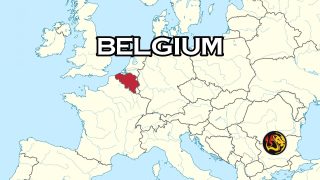by Stefan J. Bos, Worthy News Europe Bureau Chief
BRUSSELS (Worthy News) – Belgium’s security forces used tear gas and a water cannon to disperse tens of thousands of protesters who flooded Brussels, the national and European Union capital, to express outrage over Prime Minister Bart De Wever’s proposed austerity measures.
Minor scuffles broke out between police and protesters, some of whom played drums and horns and set off flares and smoke bombs while chanting against cuts to social welfare programs.
Police vehicles chasing protesters were seen smashing up bicycles, and officers out of uniform but identified by red arm bands detained demonstrators, tying their hands with plastic bands.
At one point, police officers on bicycles reportedly sought shelter from a large group of protesters inside a hotel. Belgium’s Migration Minister Anneleen Van Bossuyt said on the social media platform X that she had filmed protesters vandalizing the immigration office building in downtown Brussels.
CHAOS IN THE CAPITAL
The unusually large protest crippled traffic in the heart of the Belgian capital, blocking major roads. Strikes also led to most flights being canceled at Brussels Airport and heavy disruptions at Charleroi Airport, while public transport in the city largely came to a standstill.
Organizers claimed that more than 150,000 people joined the demonstration between Brussels’ Gare du Nord and Gare du Midi train stations, crossing the entire city center. Police estimated the crowd at about 80,000.
The unrest overshadowed a nationwide general strike held in conjunction with Tuesday’s protest, which grounded most airplanes at the two main airports and disrupted train, tram, and metro services throughout Brussels.
Officials said a few dozen people were detained following incidents, including fires set on central boulevards.
REFORMS SPARK ANGER
The strike was the latest in a series of protests this year against the government’s controversial plans to reform pensions and the labor market.
Prime Minister De Wever’s coalition argues that Belgium must rein in its soaring public debt and modernize its economy to comply with European Union fiscal rules reinstated in 2025 after being suspended during the COVID-19 and energy crises.
Under the proposed reforms, the government seeks to gradually raise the retirement age to 67, tighten early retirement benefits, and revise unemployment compensation to encourage a return to work.
Officials say the measures are needed to ensure the long-term sustainability of Belgium’s welfare system, as the nation faces an aging population and budget deficits exceeding 4 percent of gross domestic product (GDP).
However, unions and left-leaning parties accuse the government of shifting the burden onto workers and pensioners while sparing corporations and wealthier citizens.
Despite the turmoil, government spokespersons confirmed late Tuesday that negotiations with unions will continue, but stressed that fiscal consolidation “cannot be postponed.”
Copyright 1999-2026 Worthy News. This article was originally published on Worthy News and was reproduced with permission.
The following code is how the above article is generated with the Worthy Suite WordPress Plugin.
[worthy_plugins_news_story_body]This is how you display a story with an image.
Police Clash With Protesters As Belgium Erupts Over Austerity Reforms

by Stefan J. Bos, Worthy News Europe Bureau Chief
BRUSSELS (Worthy News) – Belgium’s security forces used tear gas and a water cannon to disperse tens of thousands of protesters who flooded Brussels, the national and European Union capital, to express outrage over Prime Minister Bart De Wever’s proposed austerity measures.
Minor scuffles broke out between police and protesters, some of whom played drums and horns and set off flares and smoke bombs while chanting against cuts to social welfare programs.
Police vehicles chasing protesters were seen smashing up bicycles, and officers out of uniform but identified by red arm bands detained demonstrators, tying their hands with plastic bands.
At one point, police officers on bicycles reportedly sought shelter from a large group of protesters inside a hotel. Belgium’s Migration Minister Anneleen Van Bossuyt said on the social media platform X that she had filmed protesters vandalizing the immigration office building in downtown Brussels.
CHAOS IN THE CAPITAL
The unusually large protest crippled traffic in the heart of the Belgian capital, blocking major roads. Strikes also led to most flights being canceled at Brussels Airport and heavy disruptions at Charleroi Airport, while public transport in the city largely came to a standstill.
Organizers claimed that more than 150,000 people joined the demonstration between Brussels’ Gare du Nord and Gare du Midi train stations, crossing the entire city center. Police estimated the crowd at about 80,000.
The unrest overshadowed a nationwide general strike held in conjunction with Tuesday’s protest, which grounded most airplanes at the two main airports and disrupted train, tram, and metro services throughout Brussels.
Officials said a few dozen people were detained following incidents, including fires set on central boulevards.
REFORMS SPARK ANGER
The strike was the latest in a series of protests this year against the government’s controversial plans to reform pensions and the labor market.
Prime Minister De Wever’s coalition argues that Belgium must rein in its soaring public debt and modernize its economy to comply with European Union fiscal rules reinstated in 2025 after being suspended during the COVID-19 and energy crises.
Under the proposed reforms, the government seeks to gradually raise the retirement age to 67, tighten early retirement benefits, and revise unemployment compensation to encourage a return to work.
Officials say the measures are needed to ensure the long-term sustainability of Belgium’s welfare system, as the nation faces an aging population and budget deficits exceeding 4 percent of gross domestic product (GDP).
However, unions and left-leaning parties accuse the government of shifting the burden onto workers and pensioners while sparing corporations and wealthier citizens.
Despite the turmoil, government spokespersons confirmed late Tuesday that negotiations with unions will continue, but stressed that fiscal consolidation “cannot be postponed.”
Copyright 1999-2026 Worthy News. This article was originally published on Worthy News and was reproduced with permission.
[worthy_plugins_news_story_title]
<div style="text-align:right; padding:0px 0px 10px 15px; float:right; width:300px;"><img src="[worthy_plugins_news_story_image name=sm_medium]" alt="" /></div>[worthy_plugins_news_story_body]